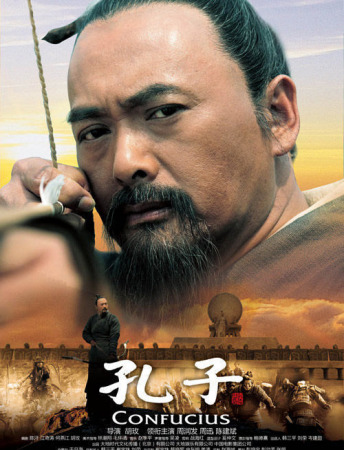发布时间: 2016年08月10日


大约10年前,我在一个朋友的客厅第一次“见到”了孔子。当然了,我所说的孔子可不是蓄着白色胡须的中国哲人的本尊,而是放在茶几上的出版物--孔子语录集。翻阅几页后,一个男人的样子便跃然出现在我的脑海中。
I FIRST met Confucius in a friend's living room, nearly 10 years ago. OK, so it wasn't really the bearded Chinese philosopher. It was a collection of his most famous lines, printed and bound and resting on a coffee table. As I scanned the pages, a vision of the man began to form in my mind。
直到上周六,我才有机会将一个人名和这张脸对应上--香港明星周润发在新影片《孔子》中出演这一圣人角色。虽然对孔子的故事并不太了解,我还是去看了这部电影。总是止不住想到,如果能在现实生活中遇到他,不知我会怎么想。
It wasn't until last Saturday, though, that I finally had a chance to put a name to the face-that of Hong Kong star Chow Yun-fat, who plays the sage in the new biopic Confucius. I went to see the film knowing very little of Confucius' personal story. I left wondering what I would have thought of the man if I really had met him in person。
我会不会像影片中的那个农民,无视前来问路的孔子及其弟子,继续收庄稼?会不会像片中卫灵公的姬妾南子(周迅饰)那样为了考验圣人的耐力而要求与之见面?又或者,我会不会像片中的年轻人那样抛弃一切随他前往那片荒野之地?
Would I have been like the farmer in the film who kept on bundling grain when Confucius and his disciples stopped and asked for directions? Would I have been like the alluring consort (played by Zhou Xun) who requested a meeting with the sage only to test his human mettle? Or would I have been one of the young men who left everything to follow him into the wilderness?
我想,这一切都取决于《孔子》导演胡玫对那段历史的深刻了解。
I suppose it all depends on the historical accuracy of director Hu Mei's Confucius。
影片中,我们看到的是一个集谦恭、博学、幽默、智慧、守纪、严格于一身的圣人形象。即便是周迅所扮演的南子几乎扑在孔子身上时,他的脸上闪过一丝欲望后便走开了。
In the movie, we see a man who is all at once humble and wise and humorous and intelligent and disciplined and firm and clever. Even when Zhou's character all but throws herself on Confucius, the philosopher walks away with barely a trace of desire on his face。
如 果,这就是那个人的真实面目,那么,与他见面将是一件十分令人兴奋的事情--但同时也会让人感到压抑。影片中,孔子讲求从内心深处来改变一个人。这确实是 个高尚的目标。从我的个人经历来看,这事说起来容易,做起来却很难。例如:我很难想象在不借助任何超自然力量的前提下从这么一个性感女性身边走过--不管 我铭记了多少圣人格言也无济于事。
If this is, indeed, the real man, meeting him would be, all at once, an incredibly exhilarating experience-and also a very depressing one. In the movie, Confucius talks of changing oneself from within. This is certainly a noble goal. Based upon my own experience, though, it is much easier said than done. For example, I cannot imagine walking away from the temptress without the assistance of a supernatural power-no matter how many of the sage's proverbs I had internalized。
从这点来看,我比以前更敬畏孔子了。只有真正落实这些话后,这个人的言语才更具意义。如果孔子其人真如周润发所演绎的那样,他真是个名副其实的圣人。
In this sense, I am more in awe of Confucius than ever before. A person's words take on far more significance when he or she actually lives them out. If Confucius really was the man that Chow portrays, he was indeed one for the ages。
即便如此,我仍不能确信自己能否像片中他的追随者那样放弃一切--家庭、生计、故乡,日夜追随他左右,以马肉汤为生。如果说孔子也有缺点的话,那就是他抛弃了自己的妻子、女儿,只为将他的哲理传遍中国。
Still, though, I'm not quite sure I'd have given everything-family, livelihood, home-to sit at his feet day and night and live on horse-meat soup, as his followers do in the movie. For if Chow's Confucius has one flaw, it's that he abandons his wife and daughter in order to spread his philosophy throughout China。
在 我看来,这是整部电影中最让人悲伤的情节。孔子不顾妻子的挽留毅然离开,镜头随着他进入了暴风雨中。在之后的影片中,我们再也没有听到关于他家庭的任何消 息。我想,孔子的决定,对自己是个正确的选择--或者,是对整个国家最好的决定。然而,从我个人的角度来看,这个决定却至少有一点出自他的骄傲。这一点固 然可以原谅,但我却不会做同样的选择--即便给我追随他的机会也是枉然。
For me, this scene marks the saddest part of the movie. When the sage wrests himself out his wife's grip and the camera follows him into a rainstorm, we never hear from his family again. I suppose Confucius did what, to him, was right -or, rather, what was best for the country. From my perspective, however, it was a decision made, at least in part, out of pride. It's certainly forgivable, but it's not one I would have made myself were I given the chance to follow him。
编辑推荐: